Mayha, London, restaurant review: This intimate, creative omakase restaurant will delight Japan fans
For omakase, the guest tells the chef ‘I’ll leave it up to you’ – and this exclusive Japanese joint puts you in safe hands, says Lucy Thackray

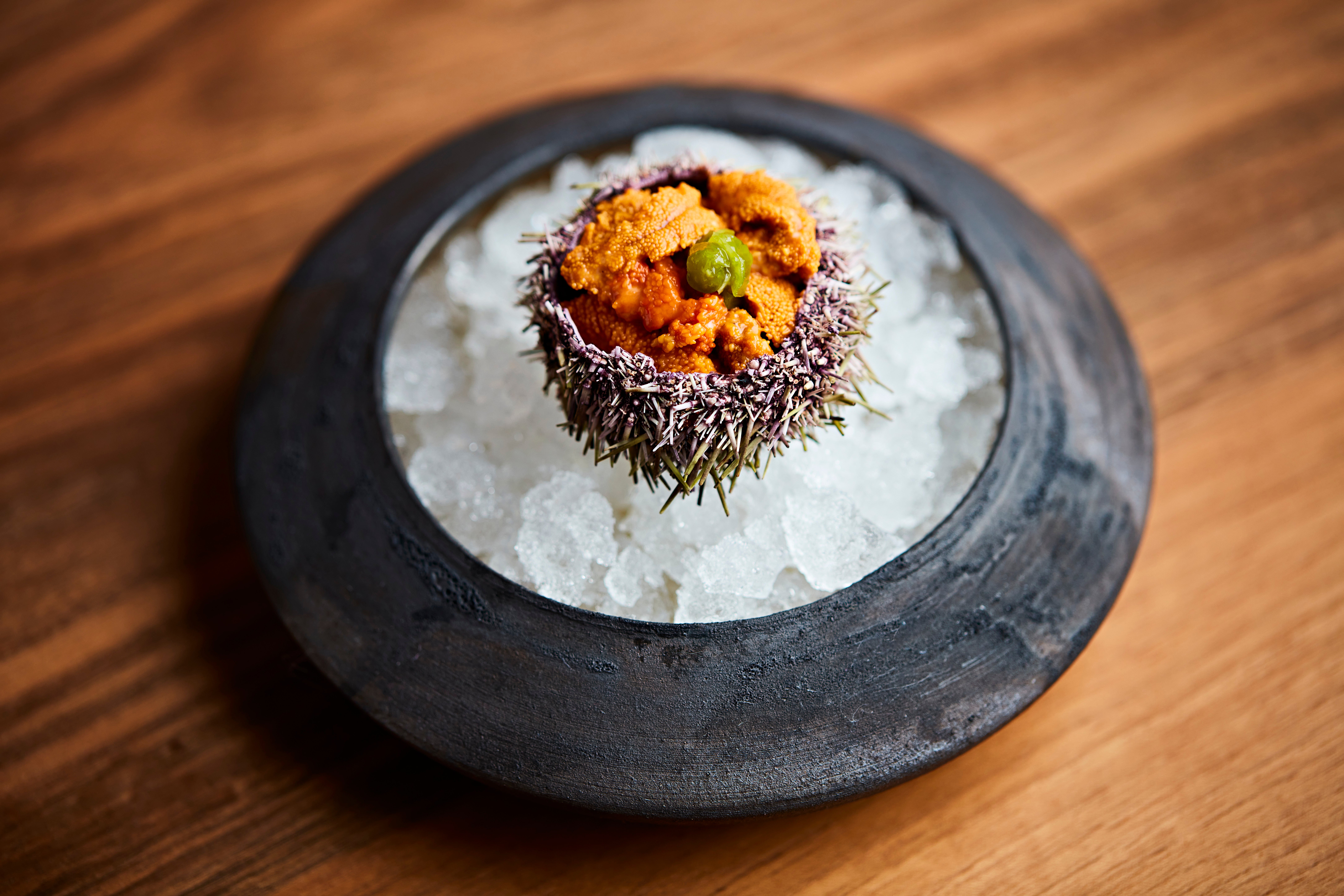
Japanese food, done right, is more than just a meal – it’s a masterclass in mindfulness. That’s how it feels at Mayha, anyway, a petite omakase restaurant that recently opened in Marylebone, London.
Picture sitting at a buffed walnut-wood counter, with just light black chopsticks and delicate water tumblers at your side. Behind the counter, a couple of chefs are industriously sculpting, chopping, fanning and sizzling. You can see each mouthful coming towards you. Each bite arrives on its own tiny pedestal, with an explanation for context. It’s consumed fresh, just teased into place by your chef.
It’s calming. It’s compelling. It’s completely addictive.
A concept originated in Beirut and now replicated in the UK capital, Mayha is a temple to omakase: a Japanese style of multi-course feast that changes depending on the whims of the chef. Helmed by Jurek Wasio and Yuichi Nakaya, it has just 11 seats, with only five occupied the night we visited, giving it the feel of a supper club meets intimate audience with a chef. Literally translated, it means, “I’ll leave it up to you” – when you opt for omakase, you are putting yourself in the chef’s hands.
And what hands! Anyone who’s seen the magnetic documentary Jiro Dreams of Sushi will appreciate the meditative nature of watching a pro chef cup a portion of nigiri like a baby bird, shaping the fresh sliver of fish around it and anointing it with a fine layer of quality soy sauce.
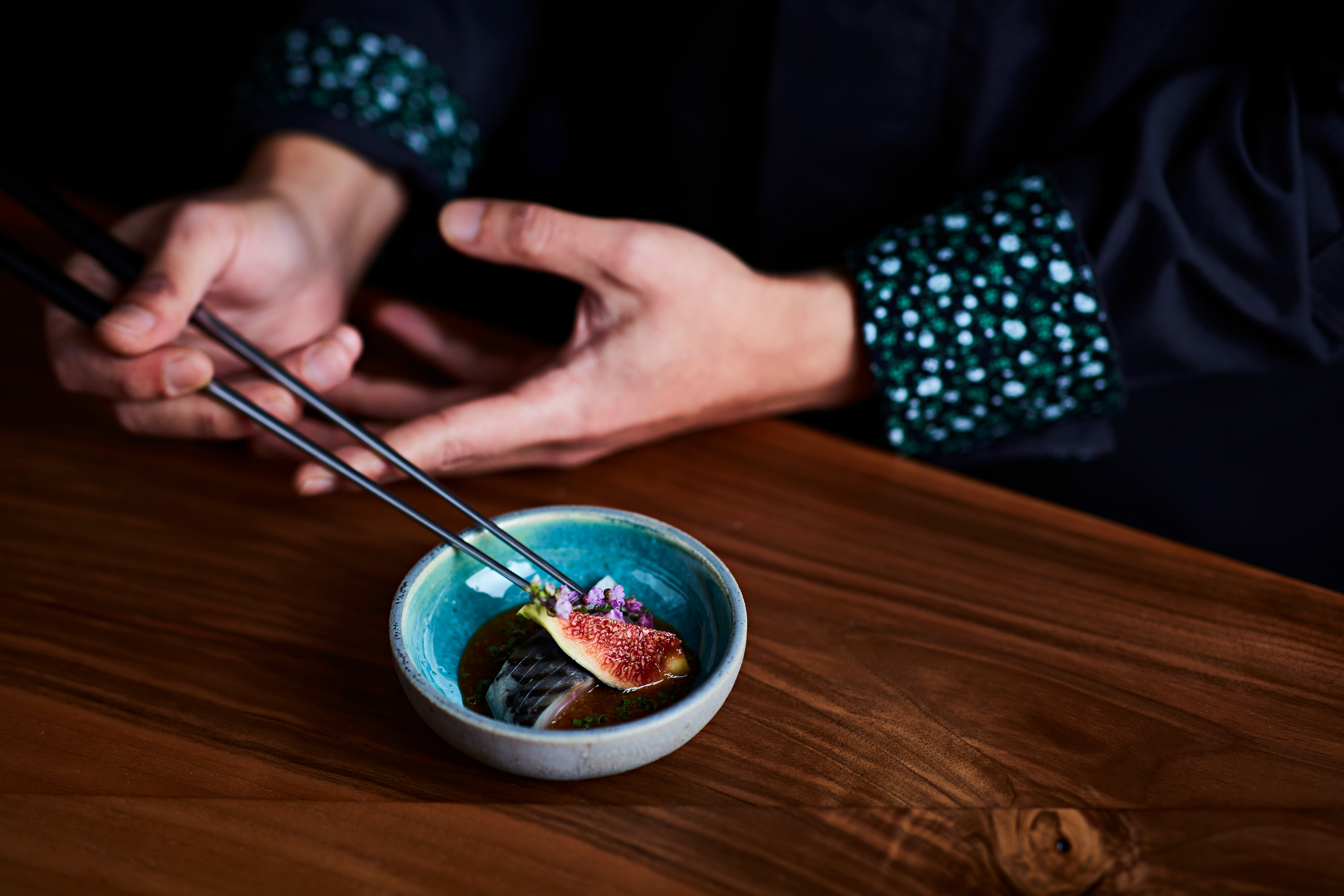
But sushi is just one leg of this journey: first, we stop at a small ceramic cup full of delicately fragrant clam soup. This is followed in neat succession by raw scallop with caviar and a citrussy foam, with a subtly zingy salt-and-vinegar flavour against the creamy fish.
A sliver of fresh mackerel topped with fig appears as if by magic (palm-sized plates are quietly whisked away the second you finish, with fresh ones being delivered to the counter in front of you). Uni (raw sea urchin) comes prettily cupped in a chunk of its own purple, spiky shell, but its slippery texture and intense salty-muskiness won’t be for everyone.
A nugget of venison is served on the rare side, with a fruity compote and a drizzle of coffee-scented oil giving a smoky taste. A standout quail invention with caramelised skin and sharp kumquat jam is served with a sprinkle of sea salt and a wedge of lime, tequila slammer style, inviting you to get as sour and salty as you please. The flesh is piping hot and memorably juicy. Mayha’s pacing of fresh seafood and more umami-packed meat dishes is a real treat.
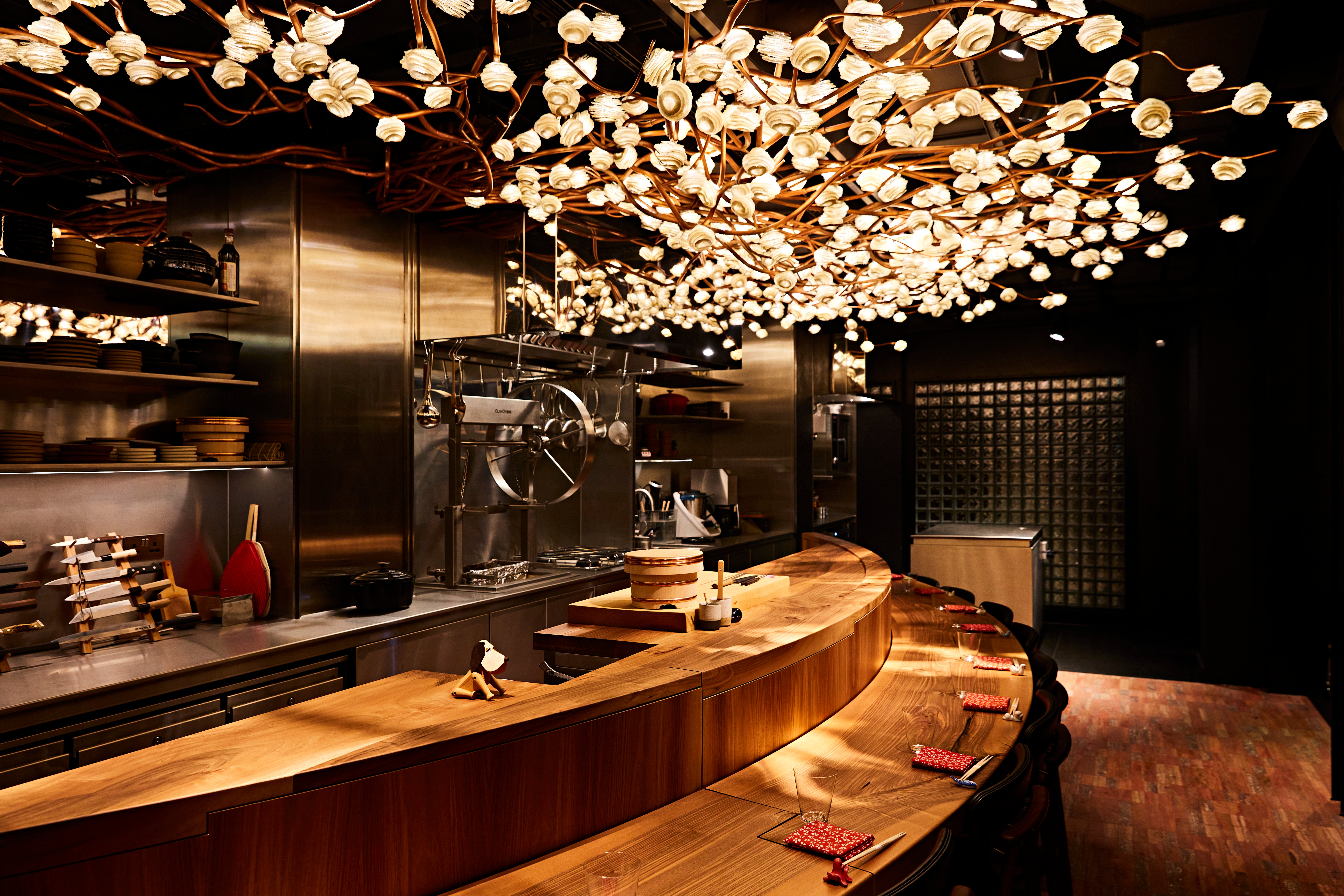
Another highlight is a creamy dashi custard, topped with fat pearls of lurid orange tobiko and gently sauteed girolle mushrooms. We ask about a striking herb we can detect in the mix, and Mr Nakaya is delighted to introduce us to it: shiso, which he brings out cuttings of for us to pick and smell. There’s a bit of Charlie and the Chocolate Factory adventure to proceedings; these guys appreciate the potential magic of a tasting menu.
Next up, a mysterious, glossy red orb, presented alone on a bowl of crushed ice. On first bite, this turns out to be half a plum, skinned, cold and mouthwateringly sour to the tongue. It’s hard not to conjure a Simpsons-drawn Yoko Ono saying, “A single plum, floating in perfume, served in a man’s hat” (damn our meme culture) – but it’s actually a terrific palate cleanser.
Because next is a parade of sushi, involving several types of tuna nigiri (lean and ruby-red, fatty and seared to sticky perfection). A chunk of raw stone bass is a thing of purity, with a perfect-sized fleck of fiery wasabi and still-warm sushi rice alive with just a trace of vinegar. Scottish langoustine is topped with caviar, yellowfin tuna is fabulously lean.
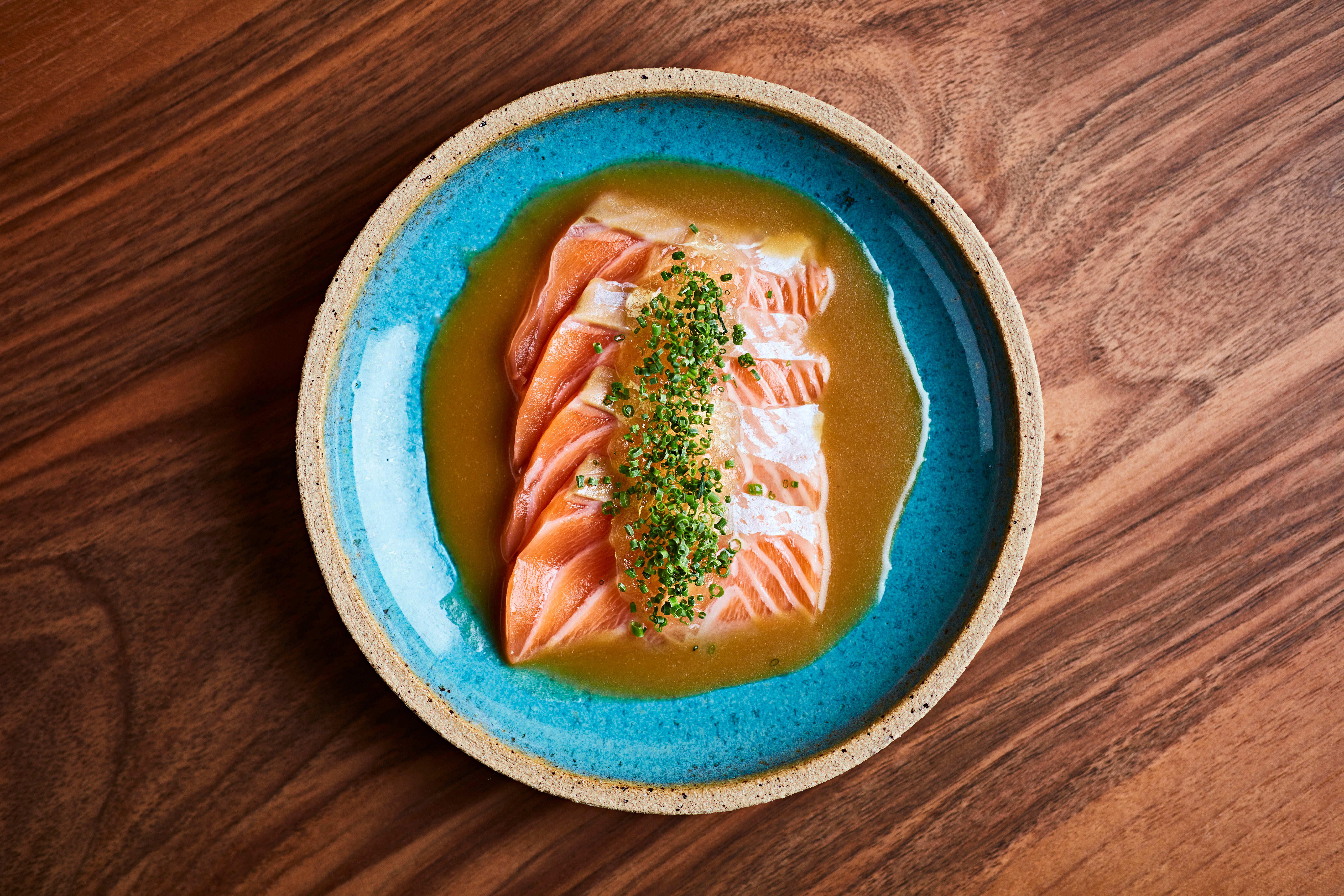
Little details up the luxury factor: pickled ginger has been chunkily sliced and clearly pickled fresh rather than scooped from a jar. It looks so appealing that my partner starts tucking in before the sushi even arrives, assuming it an accompaniment to the sour plum. At one point the chef passes us a saucy eel nigiri which is (intentionally) on the point of crumbling out of form, advising us to inhale it as quickly as possible for peak flavour.
Decor isn’t necessarily the focus here, but the dining room is a simple and effective love letter to Japanese hospitality: when you walk in, your eyes are drawn upwards to an imiatition tree, with shell-like blossoms made from softly illuminated paper lanterns. Dashes of homespun detail avoid falling into the sharp-edged, five-star look of Japanese restaurants usually found in hotels: napkins are scarlet; my ceramic chopstick rest is in the shape of a chicken, while someone else’s is a small painted whale.
The overall vibe is impressive, but somehow relaxed, confident and unshowy. This isn’t theatrical “pan-Asian” dining made for Instagram, in the style of the Ivy Asia or multi-city opening Tattu; it’s understated Japanese fine dining which takes its heritage seriously, but isn’t afraid to add a twist here and there.
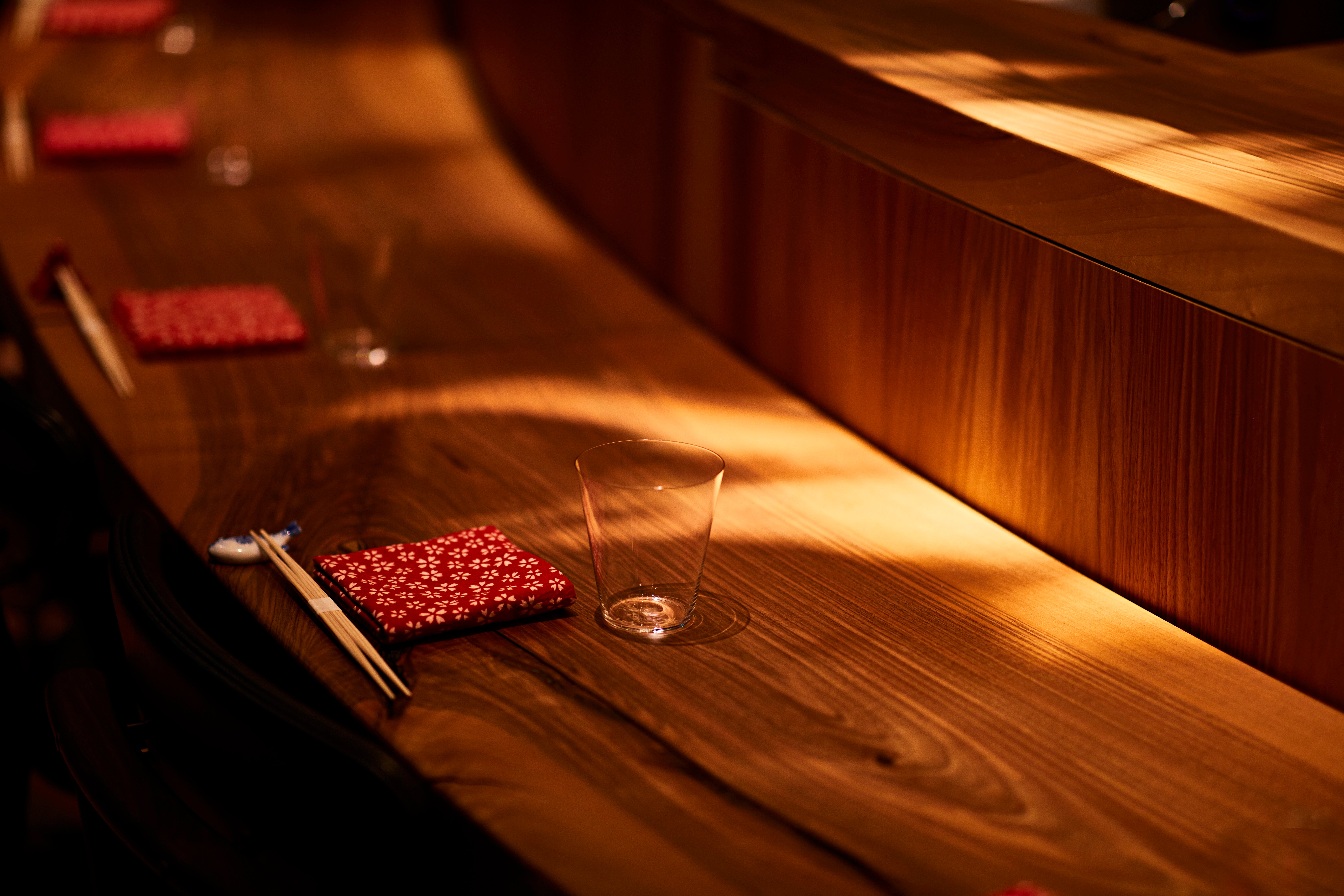
Mayha is priced with special occasions and a high-net-worth crowd in mind: the menu of 17-19 palm-sized courses cost £210pp. You won’t get a mini bonsai tree or a cloud of dry ice for that, but you will be able to zoom in with laser focus on each note of each carefully created mouthful, taking time to thank the restaurant gods as you go. You can add a wine or sake pairing for £75 a head.
At the end, the supper club atmosphere is complete when staff invite our handful of diners to the downstairs bar for a nightcap. At the end of 19 courses, we’re feeling fresh, just comfortably full, having had restrained sips of sake and wine with our dishes – anything frillier felt as though it would attract from the chef’s skills.
The menu at Mayha will change four times a year, with the seasons, with some smaller day-to-day swaps made when intriguing ingredients are available. There are two seatings per evening: you can go at 6pm, but we experienced the later, 9pm slot. We found this whizzed along fairly quickly, with plates served up pretty constantly over the course of a couple of hours. A nitpicker might suggest more of a breather between mouthfuls, but then that nitpicker would be going against the chef’s vision – hardly the point of omakase. Like the Japanese, I’ll leave that up to them.
Join our commenting forum
Join thought-provoking conversations, follow other Independent readers and see their replies
Comments
Bookmark popover
Removed from bookmarks